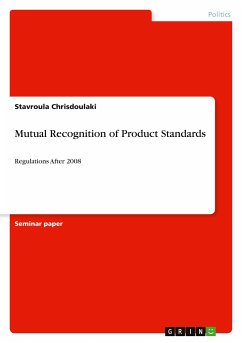
Fortress Europe? How Automated Facial Recognition Technology Undermines Human Rights

PAYBACK Punkte
0 °P sammeln!
Seminar paper from the year 2020 in the subject Politics - International Politics - Region: Western Europe, grade: 2,0, University of Twente , language: English, abstract: The aim of this paper is to investigate to what extent the EU's strategy for securing its borders aligns with the primacy of human rights and what impact European migration policy measures have on the EU's legitimacy.In order to answer this question, a systematic literature review was carried out based on Schmidt's (2013) classification of legitimacy into input, output, and throughput and taking into account the concept of h...
Seminar paper from the year 2020 in the subject Politics - International Politics - Region: Western Europe, grade: 2,0, University of Twente , language: English, abstract: The aim of this paper is to investigate to what extent the EU's strategy for securing its borders aligns with the primacy of human rights and what impact European migration policy measures have on the EU's legitimacy.In order to answer this question, a systematic literature review was carried out based on Schmidt's (2013) classification of legitimacy into input, output, and throughput and taking into account the concept of human rights of the EU. Input legitimacy was examined in the context of the border governance of the Schengen border regime, output legitimacy was judged in the context of the EUROSUR policies, especially the use of AFRT at borders and the refugee distribution scheme of the Dublin Convention. Throughput legitimacy was analyzed taking into account the criterion of accountability within the privatization of the border management. The examination of these aspects has shown that the EU policy on migration is highly contradictory and deficient in all areas of legitimacy. There are no uniform ways of acting, nation-state interests remain dominant, policies conflict with human rights, there is no clarity about who is accountable for certain measures. On the basis of the insights gained, five recommendations for action have been drawn up for the EU Commission, which should contribute to coping with this crisis.Since the introduction of the Schengen Agreement in 1985, the task of border security has shifted from national borders to the European external borders. Although this agreement has led to greater European integration and to a certain degree to a common European identity, opinions are divided on how to deal with humans outside of the Schengen borders. With the increasing migration flows towards Europe since the Syrian Conflict in 2011 and the ensuing EU policies, the EU has increasingly become a protected fortress, which recognizes migrants as a threat. At the same time, the EU presents itself as a protector of human rights.













